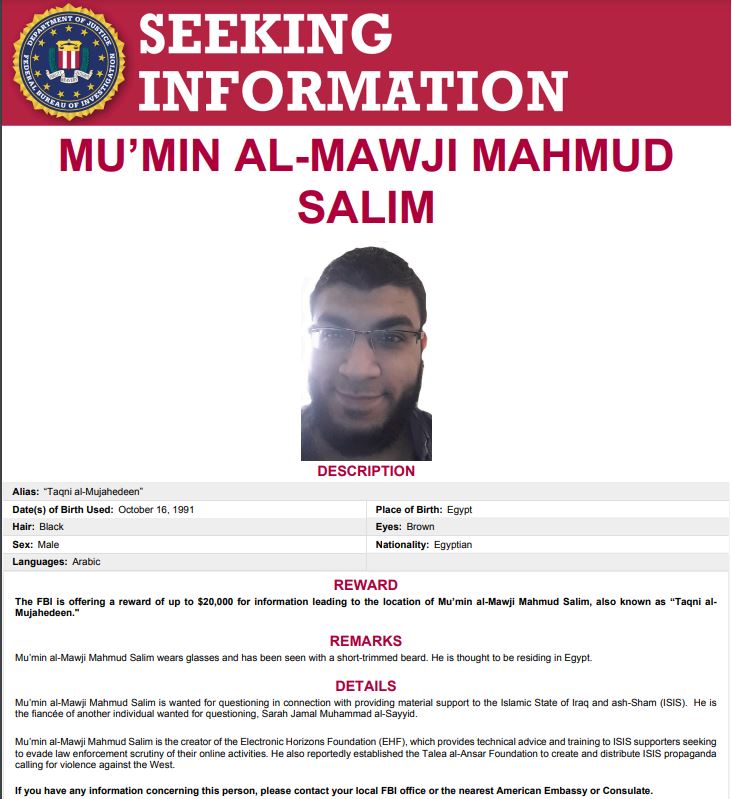The FBI is offering a $20,000 reward for anyone providing information to the agency regarding the whereabouts of cybersecurity expert Mu’min Al-Mawji Mahmud Salim, also known as ‘Taqni al-Mujahedeen’.
The US Treasury Department announced sanctions today against two Egyptian nationals, Mu’min Al-Mawji Mahmud Salim (alias “Taqni al-Mujahedeen”) and Sarah Jamal Muhammad Al-Sayyid, for allegedly running the Electronic Horizons Foundation (EHF), a platform providing cyber tools and training to ISIS supporters.
Mu’min Al-Mawji Mahmud Salim, identified as the alleged creator and leader of the apparent ISIS-affiliated platform Electronic Horizons Foundation (EHF), has been accused of providing cybersecurity guidance and training to ISIS supporters. His partner, Sarah Jamal Muhammad Al-Sayyid, allegedly aided in establishing EHF and procured web servers to host ISIS platforms.
The Accusation:
The Treasury Department accuses EHF of playing a crucial role in bolstering ISIS’s online presence and financial networks. Their alleged activities include:
- Providing online security tutorials: EHF reportedly taught ISIS supporters how to evade law enforcement through encryption, anonymization tools, and online cover-up techniques.
- Facilitating cryptocurrency fundraising: The platform allegedly instructed ISIS members on using cryptocurrency wallets and exchanges to fundraise for the group’s activities without detection.
- Sharing technical expertise: EHF is accused of offering technical assistance to ISIS, such as building and maintaining a secure online infrastructure for communication and propaganda dissemination.
Impact of the Sanctions:
The Treasury Department’s sanctions freeze any assets Salim and Al-Sayyid hold in the United States and prohibit US citizens and businesses from engaging in financial or commercial transactions with them. Additionally, a $20,000 reward (PDF) is offered for information leading to their arrest or conviction.
According to Under Secretary of the Treasury for Terrorism and Financial Intelligence Brian E., these measures aim to disrupt ISIS’s financial operations, including the use of cryptocurrency, and prevent the group from leveraging its online presence for recruitment and propaganda purposes.
This announcement can be a significant development in disrupting ISIS’s online activities. Cybercrime and anonymous fundraising are vital to the group’s operations, and these sanctions aim to cripple their financial and technological support networks.
Notably, this isn’t the first US action against ISIS’s online presence. In August 2020, the United States claimed to have disrupted three cryptocurrency campaigns run by terror groups, including the Al-Qassam Brigades (the military wing of Hamas), Al-Qaeda, and ISIS.
RELATED ARTICLES
- Man Accused of Terrorism Over Encrypting His Blog Site
- Anonymous hacks ISIS website; infecting users with malware
- Someone Hacked Swedish Radio Station to Play Pro-ISIS Song
- Muslim Hackers Hack ISIS website; expose 2,000 subscribers list
- Anonymous Muslim Group Confusing ISIS with Porn and Fake News
- Russian hackers sent death threats to US army wives posing as ISIS

